An aquarium fish diet is essential for fish health. A balanced diet contains various nutrients. Each nutrient has its own effect on the fish. This article will help you understand health-effecting parameters and balanced diet nutrients for fish. You’ll also find an exclusive discussion about vitamins, sources, and their effect on fish health. How to prepare a balanced diet for your fish will conclude this topic.
Content Table
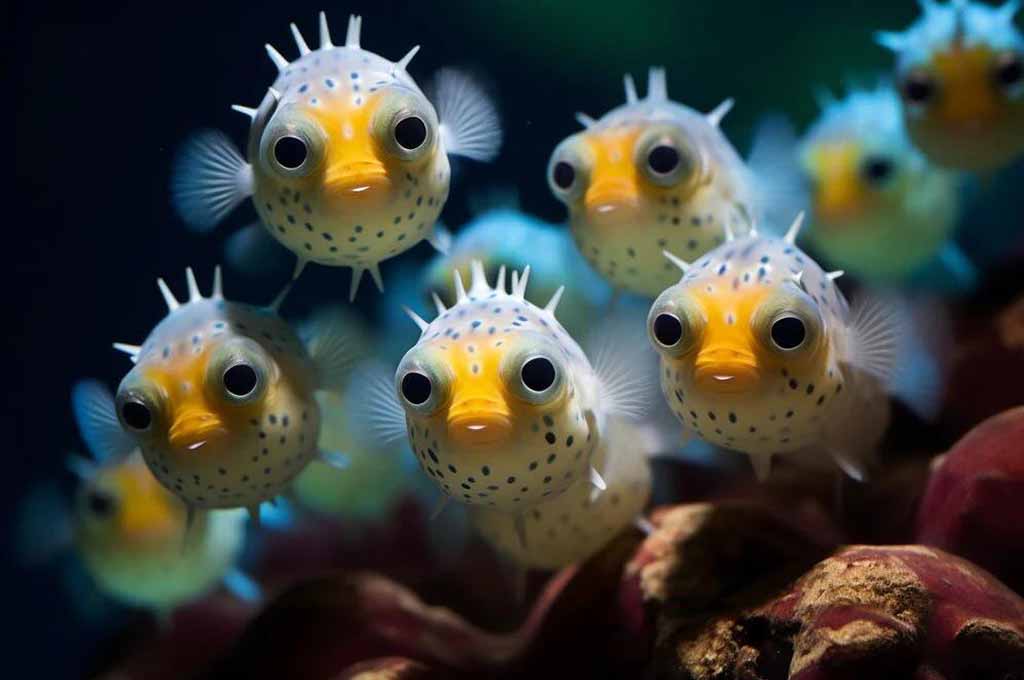
Aquarium fish diet
Keep Fish Healthy in Aquariums
Numerous parameters are crucial in keeping a fish healthy in the tank. Here are some of them.
Water Quality
In an aquarium, water is the top parameter that affects the fish’s health. Fish respirate by using the oxygen dissolved in water. The dissolved oxygen level varies with temperature, ammonia, nitrite poisoning, etc.
pH of the water should be optimal. pH affects fish growth and reproduction of fish. Maintain the water hardness within proper range as it affects the fish osmoregulation and overall fish health. Water quality also affects the algae growth.
Water Temperature
The other parameter that affects the fish’s health is water temperature. It influences fish’s metabolism and respiratory and immune systems. Too low temperatures make the fish slow. Fish lose their appetite and become vulnerable to diseases.
High temperature reduces the oxygen level and kills the beneficial bacteria. It leads to suffocation and ammonia-spike in the tank. The sudden temperature changes cause stress in your aquarium inhabitants.
Filtration
Leftover food, fish poop, and many other parameters cause tank pollution. Beneficial bacteria continually disintegrate them. However, install an excellent filtration system to keep your fish healthy.
Aeration
Well-aerated tanks are less prone to stress, water quality remains optimal, and fish don’t breathe heavily. Moreover, it reduces the fish mortality rate and controls the algae growth in the tank. So, choose a proper air pump for your tank according to tank size and fish species.
Diet
Diet is one of the most crucial in maintaining fish health. It regulates fish metabolism, promotes growth, and sustains fish health. A prepared aquarium fish diet is a good option. These manufactured diets provide all-natural nutrients besides components that promote their physiological functioning.
Synthesized fish food includes Arginine, which enhances T-cell-mediated immunity. It also supports the synthesis of nitric oxide, which aids the immune system. β-Glucans is another nutrient supplement, which boosts the immune response and disease coping ability. Mannan Oligosaccharides and Immunostimulants also improve the immune system.
Tank Size
Tank size also affects the fish’s health. Optimal tank size helps to avoid stress and competition among fish for food and space.
Lighting
Lighting helps to support the circadian rhythm of fish in your tank. This rhythm varies among species, e.g., tropical fish need 12-hours day and 12-hours night. It also impacts the overall fish behavior, i.e., growth, sleep, breeding, and social activities. Moreover, lights also improve the fish’s mood, i.e., blue and green create the calmness in the tank. It also influences the reproductive hormones.
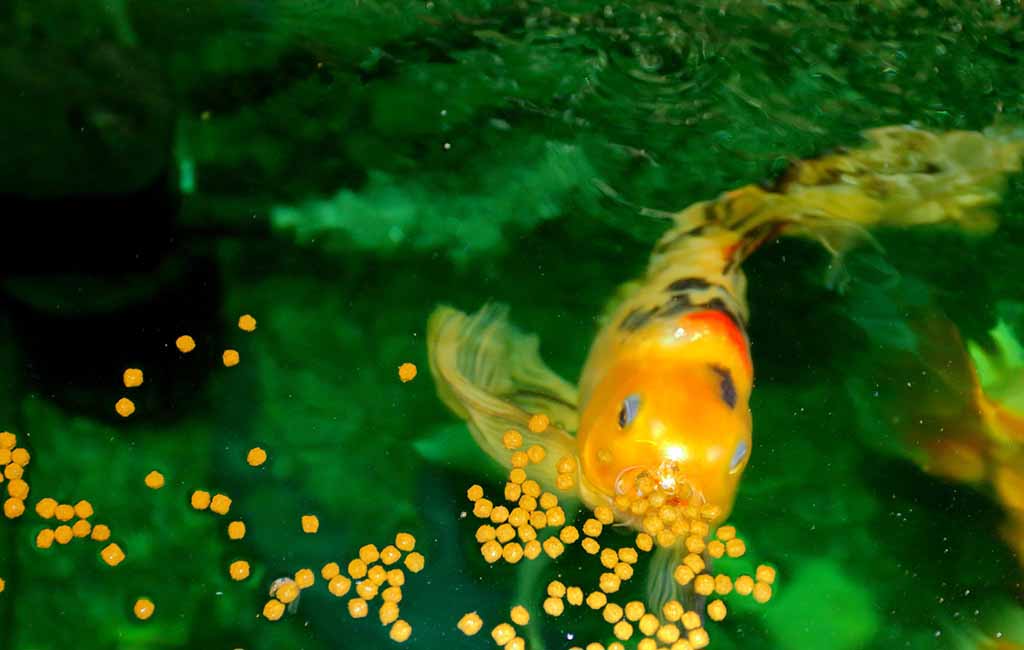
Nutrients for fish
Providing Energy to Aquarium Fish
After water, a proper diet is the primary requirement for aquarium fish. A balanced diet gives them energy, along with providing them with soothing scenery. There are some basic questions, i.e., What is a proper fish diet, and what should it contain? Here are different nutrients for your fish and how they help boost your fish.
Protein
Protein is one of the essential nutrients in an aquarium fish’s diet. It provides amino acids to fish that are essential for
| Energy | Reproduction | Enzyme synthesis |
| Growth | Protein synthesis | Muscle development |
However, protein dose varies with species, age, water parameters, fish count in the tank, etc.
Fats
Fat or lipids are about 5-10% of an aquarium fish’s diet. Fats double the energy of protein and carbohydrates. They provide
| Energy | Fat-soluble vitamins | Reproductive health |
| Essential fatty acids | Immune system support | Integrity of the cell membrane |
Carbohydrates
Carbohydrates are another essential nutrient for aquarium fish food. These are instant energy resources for fish metabolic processes. They also help to retain protein and lipids. They rescue the nitrogen load in the tank, maintain proper fish growth at a low cost, and support the fish’s immune system.
Vitamins
Vitamins are crucial for proper fish health as they act like enzyme cofactors. They help to maintain the fish’s immune system. There are about 11 water-soluble vitamins that are essential for fish.
| Thiamine | Niacin | Folic acid | Ascorbic acid |
| Riboflavin | Pantothenic acid | Choline | B12 |
| Pyridoxine | Inositol | Biotin |
Minerals
Minerals are another nutrient that is essential in the aquarium fish diet. Minerals help in:
| Help in skeleton development | Serve as a structural constituent for soft tissues |
| Maintain osmotic pressure | Keep the acid-base balance in the tank |
| Control the nerve impulses and muscle contraction | |
Here are the micro and macronutrients that should be in the fish diet.
| Macro Minerals | ||||||
| Calcium | Magnesium | Sodium | Potassium | Phosphorus | Chlorine | Sulfur |
| Micro Minerals | ||||||
| Iron | Zinc | Manganese | Copper | Iodine | Cobalt | Nickel |
| Fluorine | Vanadium | Chromium | Selenium | Molybdenum | Silicon | Tin |
Amino Acids
They are essential for proper growth and fish maintenance. Like, arginine supports the immune system, and Lysine improves tissue repair and fish growth.
Fatty Acids
Fatty acid helps in cell membrane integrity and also reduce inflammation.
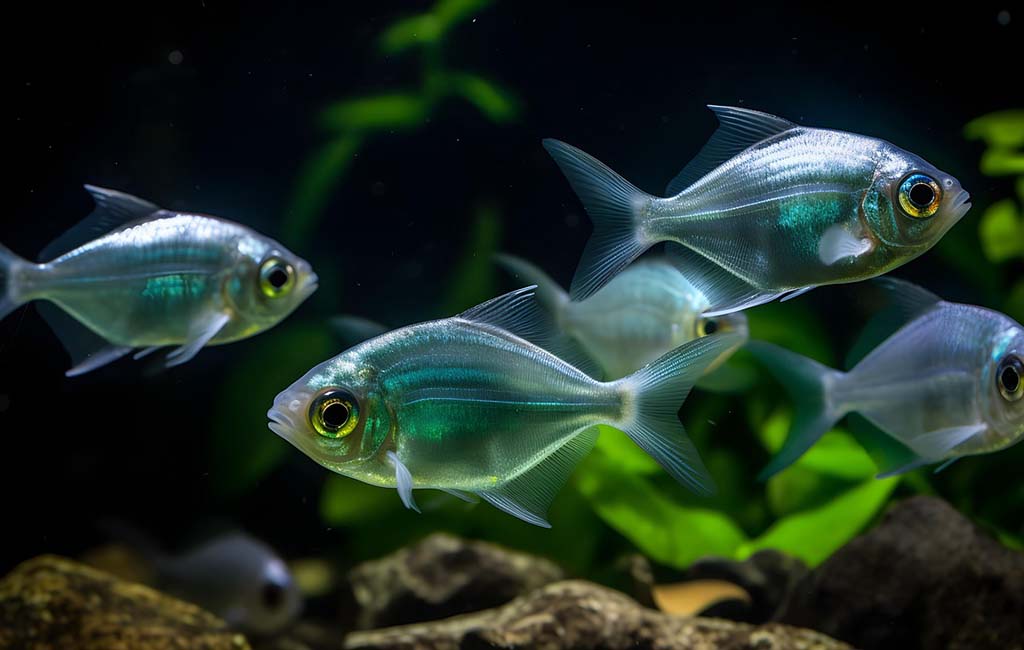
Balanced diet for fish
What Vitamins Do Fish Need?
Vitamins act as enzyme cofactors. They help to improve the fish’s metabolism and promote optimal growth. Hobbyists often focus on vitamin C. However, other vitamins are equally essential. Here are the vitamins required by fish and their functioning.
| Vitamin | Source | Role |
| Vitamin A | Fish Oil Krill Carotenoid-rich ingredients |
It helps to improve the following Vision Immunity Growth Oxidation resistance Glucose and lipid metabolism Erythropoiesis Regulation of iron metabolism |
| Vitamin C | Ascorbic Acid Citrus Fruits Extract Leafy Greens Extract |
It improves the Growth Bone and teeth Skin Immune system Blood vessels Help in Wound healing |
| Vitamin D | Fish Liver Oil Sun-dried Algae |
It promotes Optimal growth Improve bone health |
| Vitamin E | Wheat Germ Oil Sunflower Oil Soybean Oil Almond Extract |
Enhance the immune system Reduce stress Boost disease resistance |
| Vitamin B6 | Yeast Extract Soybean Meal |
It synthesise Folic acid Steroid hormones |
| Vitamin B12 | Shrimp Meal Spirulina |
It helps the fish in the following aspects Feed utilization rate Protein efficiency ration Relative growth rate Growth relative length Survival rate of larvae |
Make a Balanced Diet for Aquarium Fish
Making a balanced aquarium fish diet includes various steps.
Know the Dietary Preference
Know the diet preference of your fish. There are three categories.
| Fish food preference | Food items |
| Herbivores | Plant-based food |
| Omnivores | Mic of plant and animal-based food |
| Carnivores | Animal-based food. |
Other than these fish, there are special diet fish. They required high fiber and protein food.
Feeding According To the Life Stage
Fish have different nutritional requirements at various life stages.
| Life stages | Diet preference |
| Fry | High-protein |
| Adult | A balanced diet with all nutritional components |
| Breeding | Extra protein and vitamins |
Essential Nutrients
Include all the essential nutritional components in your fish diet. It includes protein, lipids, carbohydrates, vitamins, and minerals.
Boosters
Alongside routine food, add booster supplements in daily doses. Probiotics enhance digestion, and Immunostimulants improve disease resistance. Maintain proper feeding frequency, as it’s also very crucial for optimal fish health.
Keep the Variety
To maintain the feeding interest of your fish, feed them a variety of food items. These food items vary for different dietary preferences of fish species. You can easily find alternatives to your daily food items in the market. According to your fish species, age, and health condition, you can also prepare fish food at home.
Concluding Thoughts
A healthy fish depends on various parameters, i.e., diet, light, water quality, temperature, etc. Diet is the most crucial parameter after water parameters. A healthy fish diet includes protein, fats, carbohydrates, vitamins, minerals, etc. Vitamins help to maintain metabolism and act as enzyme cofactor. Check the dietary preferences, add essential nutrients, and maintain a variety to make a balanced fish diet.
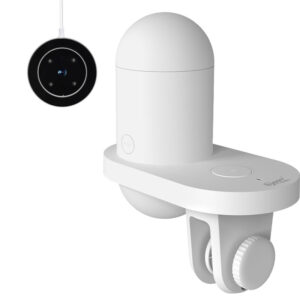
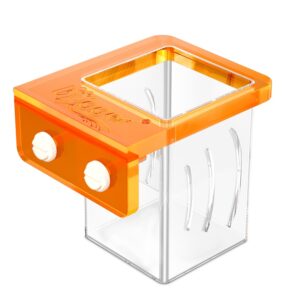
Leave a comment